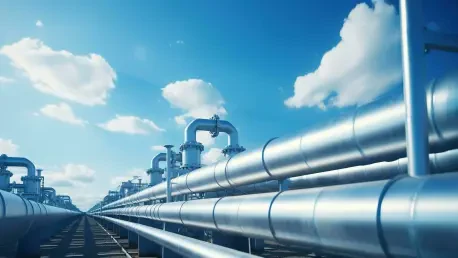In a historic move reflecting a strategic pivot in energy policy, the European Union (EU) has announced its commitment to end reliance on Russian gas by 2027. This decision arises against the backdrop of geopolitical tensions ignited by Russia’s 2022 invasion of Ukraine. The situation has now reached a new phase with the EU setting non-binding targets to transition away from Russian fossil fuels, an action that promises to reshape the region’s energy landscape.
Strategy for Energy Independence
The EU’s executive body, the European Commission, has introduced a comprehensive “roadmap” addressing the legal and economic strategies intended to reduce dependency on Russian gas. This plan includes guidance for EU companies to terminate existing contracts with Russian suppliers over the next two years. While terminating these contracts can be complex due to the potential application of “force majeure” clauses and financial penalties, the EU remains committed to facilitating this transition. As Europe has experienced a drop in Russian pipeline imports, it still faces a reliance of approximately 19% on Russian gas through alternate channels such as LNG shipments.
In conjunction with legal reforms, there is an increased focus on diplomatic strategies aimed at fostering international alliances. A particularly significant element of this strategy is the EU’s decision to amplify imports of U.S. liquefied natural gas (LNG), which aligns with American calls for Europe to adjust its trade dynamics. Diplomatic efforts also extend to securing collective consensus among EU member states to ensure a coordinated approach, mitigating opposition from countries with significant Russian energy dependencies like Slovakia and Hungary.
Technological and Innovative Initiatives
In addition to geopolitical maneuvering, the EU recognizes the critical role of technological innovation in achieving energy autonomy. Recent forums have showcased advancements in sustainable energy technologies that promise to play a pivotal role in reducing reliance on Russian supplies. Stakeholders engaged in interactive workshops aimed at exploring innovative solutions to diversify and secure energy supplies. These gatherings encouraged active discourse and collaboration among participants, further highlighting the importance of cutting-edge solutions in the pursuit of energy security and independence.
Road Ahead in the Energy Transition
Following the unveiling of the EU’s roadmap, attention now turns to the future implications of this ambitious endeavor. The initiatives outlined promise to position the EU at the forefront of a global shift toward energy independence, highlighting the need to mitigate geopolitical vulnerabilities through diversification of energy sources. Further considerations will focus on ensuring economic resilience during this transition, with a keen awareness of the potential impact on energy pricing and market stability.
In summary, while challenges persist, the EU’s strategic course signifies a decisive move toward greater energy security. Prospects for sustained innovation, collaboration, and strategic alignment among member states suggest that Europe is poised to lead in the global discourse on energy autonomy and independence. Moving forward, ongoing diplomatic conversations, engaged technical efforts, and policy realignments will play essential roles in successfully navigating the complex landscape of energy transition.









